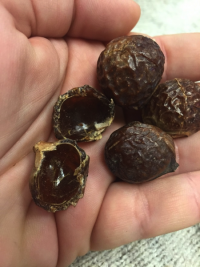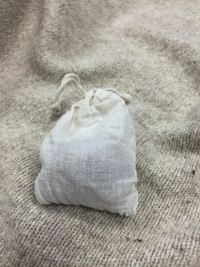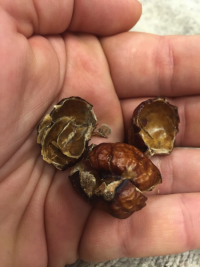
Don’t Throw Your Health and Virility out With the Wash Water
- Is this everyday task harming your reproductive organs and slowly reducing your virility?
- Wait… that man fish is now part lady fish? Yep. Find out why.
- Two natural solutions to help combat hormone disrupting chores.
A couple weeks ago, Jasmine LeMaster, chief of quality assurance here at Living Well Daily, and I were talking about the GMO Shopping Guide she’s diligently working on.
As we skimmed through different topics we’ve researched so far, household cleaning products came up.
Unfortunately, many cleaning products contain dangerous chemicals and toxic ingredients.
And since I haven’t exactly been shy about voicing my distaste for chemicals around the health quarters, she asked me for some suggestions. I will share a few of these suggestions for a specific chore in bit.
As our conversation went on, it became pretty obvious one common chore stood out from the rest as possibly being the most lethal. And it may surprise you.
On average, most of us do this chemical-laced task about eight times a week.
Actually, it’s so common, I’ve already done it today.
But what makes it more alarming — the dangers don’t end with completion of the chore.
The chemicals used stay in our environments and penetrate the fabrics our families wear, sleep on, and even dry our dishes with.
And what is worse, these chemicals are absorbed into our bodies through the nose, mouth, and skin. Skin is the largest and most exposed organ of your body, thus making exposures completely unavoidable.
And believe me, these chemicals are nothing to mess with — endocrine disruptors (also called “gender-bending” chemicals).
They are associated with some pretty terrifying health endpoints. In today’s issue, we will wash out what keeping clean sheets means for you.
Plus, a few tips on how to reduce their quantities in your home.
First, let’s uncover what this necessary chore is and how its products may already be affecting your body.
Dangerous Suds
Laundry is the health-ruining chore Jasmine and I were discussing — and not just because it can be time-consuming and annoying.
Laundry detergents and fabric softeners are full of synthetic chemicals, fragrances, and additives. Some of these can cause all sorts of negative health impacts on you and your family.
There are many chemical offenders in these products. I am going to highlight one of the most dangerous today. (Stay tuned to Living Well Daily for a full list of chemicals to avoid in the upcoming GMO Shopping Guide.)
Let’s get started…
The origins of health-hazardous petrochemical laundry soaps began during World War II. As fats and oils were made into explosives instead of cleaning products, scientists figured out how to turn petroleum into synthetic soaps, resulting in the creation of laundry detergent.1
One of the largest groups of sudsy offenders are nonylphenol ethoxylates (NPEs). These health and environment destroyers of the synthetic detergent world are currently banned in the European Union and Canada due to their endocrine-disrupting properties and environmental consequences.
However, here in America, we use anywhere between 270-370 million pounds of NPEs annually.2
While NPEs are allegedly biodegradable, they take a long time to break down in the environment and often turn into health-harmful chemicals during the degradation process.
Some of these chemicals cause endocrine disruption. Because endocrine disruptors mimic estrogen hormones, exposures can lead to reproductive issues, hence their nickname — “gender-bending” chemicals.
If NPE breakdown chemicals are absorbed into the body (through the skin, mouth, or lungs), the body cannot distinguish between the synthetic substance and actual estrogen.
Doing laundry with these also releases them into local watersheds, where they wreak havoc on aquatic creatures.
In fact, male rainbow trout exposed to NPEs in a lab setting become part male and part female. This is true in winter flounder, oysters, and salmon as well. Exposure can also lead to decreases in testicular growth, lower sperm counts, and damage to the kidneys and livers for fish.1
Yikes!
As terrifying as it is to hear NPEs are reproductively altering some of our aquatic brethren (and part of on our food chain), it’s even more disturbing to hear what it’s doing to mammals — specifically humans.
One study showed NPEs cause changes in the human placentas. These changes may result in fetal defects or early pregnancy termination.3
But the dangers don’t stop there.
While there haven’t been any studies on male humans, it makes one curious if the same symptoms found in fish translate, in some form, to men.
Research on other endocrine disruptors have found exposure to environmental estrogens may lead to infertility, prostate cancers, and testicular dysgenesis syndrome. 4
Furthermore, high levels of estrogen in men can increase breast tissue growth and lead to erectile impotence.5
Are those “mountain fresh” scented sheets really worth all those health effects?
Probably not.
While the jury is out on the official health effects of NPEs and their breakdown forms in human, it’s likely safest to avoid them.
And no, this doesn’t mean you have to go without washing your clothes.
Break Free of NPEs
I haven’t used standard laundry detergent in many years.
And as it turns out, Jasmine hasn’t either.
However, we still have very clean clothes. Though we use different cleaning methods — I will share them both in a moment.
And the best part? They aren’t laced with gender-bending chemicals.
While many store-bought product tout they are safe and biodegradable, they still may contain NPEs or other endocrine disruptors.
And even if they are truly free of NPEs, they may still contain health-damaging synthetics.
It’s very important to read your labels in the laundry aisle to see exactly what is in your detergents. If there is something you aren’t familiar with, look it up and find out what kind of health impact it may have on you.
Or do what we do here at Living Well Daily and avoid it.
Here is what we do instead…
The Natalie Method:
I use 1/8 cup of Dr. Bronner’s Castile Soap in the detergent drawer and 1 cup of baking soda in the load. I have an HE machine, so I don’t have to use a lot of Dr. Bronner’s. If you have a standard machine, use ¼-1/2 cup instead. This is my recommendation for a full load. Adjust quantity for load size.
Dr. Bronner’s is synthetic free and a very strong soap. The liquid form is available in a variety of essential oil-based fragrances. I use the lavender, and it really makes my clothes smell nice. The addition of baking soda helps with odor control as well as softening clothes.
You can buy Dr. Bronner’s here.
The Jasmine Method:
Jasmine uses soap nuts.
Soap what?
That is exactly what I said when she told me her laundry method.
Soap nuts, also called soap berries, are a natural fruit that comes from trees. Their husks contain saponin. Saponin creates a soaping effect. The husks are dried and then used as laundry cleaner.
After she told me about them, I became very curious. So I ordered some.
I was really impressed with how well they worked. My clothes were very clean and had a very faint fresh smell that is natural to the berry.
All you have to do is add three-five soap nuts to a muslin bag and toss in the wash!

Unused soap nuts ready to go in the wash bag.
New soap nuts will look like the ones above. You can see the shiny saponin inside.

Soap nuts in a bag ready to do their magic in the wash.
The bagged soap nuts go directly into the load. The bag and nuts need to dry if you aren’t doing consecutive loads. You can just take them out and place them on top of your washing machine. It’s not an issue if they accidentally end up in the dryer.

These soap nuts are past their prime.
The soap nuts above have made it through five wash cycles. It is time to replace them. Once they start to loose shape and inside luster, it’s time to get some new ones in your wash!
You can buy soap nuts here. There are liquid alternatives if you don’t think the nuts are a good fit for you. The liquids can replace all types of household cleansers, as well.
Laundry dangers don’t stop at the washer. Dryer sheets may be the worst toxin in your cleaning cabinets. We will dig into them and some healthy alternatives in an upcoming article, so stay tuned!
If you have any healthy laundry hacks, write me!: nmoore@lfb.org
Live well,

Natalie Moore
Managing editor, Living Well Daily
Sources
[1] Do You Know What’s in Your Laundry Detergent?
[2] Nonylphenol (NP) and Nonylphenol Ethoxylates (NPEs)
Action Plan
[4] The Effect of Environmental Estrogens on Men’s Health
[5] Signs and Symptoms of High Estrogen
Written By Natalie Moore
Natalie Moore is a dedicated health researcher with a passion for finding healthy, natural, and science-based solutions. After a decade of direct healthcare experience in western and natural medicine, she was involved in public health research before joining Living Well Daily.
View More Free Articles
Why Your Muscles Are Your Brain's Best Defense
Forget expensive brain scans and head-scratching cognitive tests that make you feel like you’re back in school. Japanese researchers have stumbled onto something that could change how we screen for memory problems—and it’s so simple, you’ll wonder why nobody thought of it sooner. A quick, painless measurement you can get during a routine checkup might...
Four Carbs that Could Add YEARS to Your Life
You’ve likely been avoiding carbs like the plague. Health gurus, fitness influencers, and diet books have convinced you that carbs are the enemy—that they spike your blood sugar, pack on pounds, and fast-track you to diabetes. So you’ve eliminated bread, sworn off pasta, and feel guilty just touching a piece of fruit. But what if...
Upgrade from Bananas and Apples to These Powerhouse Fruits
I’m often asked which fruits are the best. So, let’s talk about it. I’ll cut right to the chase: berries win this contest hands down. If you’re limiting your options to apples and bananas, you’re missing out on a universe of superior antioxidant power. Those everyday fruits are like bringing a knife to a gunfight...
The REAL Reason Americans are Getting “Fatter”
You’ve heard it a thousand times: “Americans are getting fatter because we’re lazy.” We sit at desks all day. We binge-watch Netflix instead of hitting the gym. We’ve traded physical labor for sedentary lifestyles. It’s a tidy explanation for why obesity has skyrocketed in developed countries. There’s just one problem—it’s completely wrong… A groundbreaking Duke...
Mailbag: Room Won't Stop Spinning? Do THIS First
“I’m dealing with vertigo issues, lightheadedness, and dizziness. As recently as this last Saturday I had multiple occurrences throughout the day. Is there anything I can do for this? I’m 69 and in good health. I work out 4 to 5 times a week.” —Spinning Hi Spinning, When patients approach me with similar complaints, I...
Hidden Number Secretly Sabotages Male Performance
Guys (and gals that love them), we should talk. You know how we’ve always been told that bedroom troubles are just part of getting older—that we just need to live with them? Well, it turns out that’s not true. Scientists recently wrapped up a six-year study that followed over 100 healthy men, and the findings...
Shocking Study Links Kids' Snacks to Dangerous Early Puberty
Kids are growing up in a world vastly different from the one we knew. Back in our day, if a child wanted something sweet, it was a piece of candy or a homemade cookie. Today’s kids are surrounded by products filled with artificial sweeteners that didn’t even exist when we were raising our own children....
Outdated Vitamin Guidelines Put Your Brain at Risk
If you’re like most people, you probably don’t think twice about vitamin B12—until your doctor mentions it during a routine blood test. But new research published in the Annals of Neurology suggests we need to pay closer attention to this crucial nutrient—especially as we age. Turns out, current guidelines for this essential nutrient might be...
The TRUTH About Supplement "Liver Dangers" REVEALED
There’s been a lot of buzz lately about liver damage from supplements—so, let’s talk about it. Reports of supplement-induced liver injuries have some folks wondering, “Could my natural remedy actually be harming me?” But before you toss all your supplements in the trash, let’s separate fact from fear—and talk about how to use supplements safely....
The 10,000 Steps LIE That's Ruining Your Health
I’ll be honest—I’m a little sick of the 10,000-steps theory. You know, the one that insists you need to take at least that many steps daily to stay healthy? You won’t believe where that claim originally came from. The 10,000-steps theory wasn’t handed down from the fitness gods on stone tablets. It originated from a...









